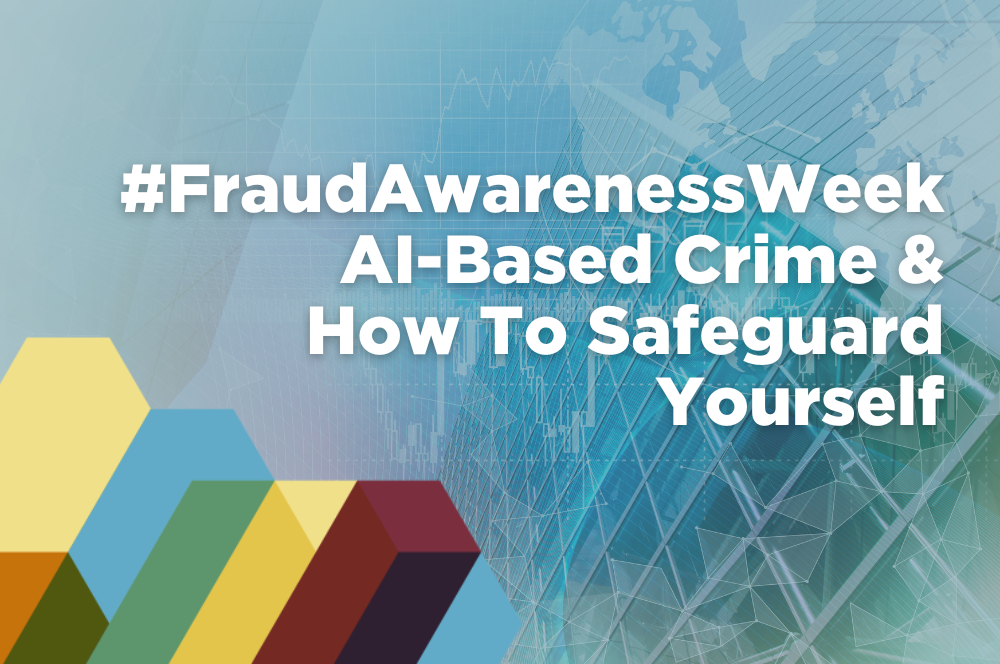
November
15
#FraudAwarenessWeek AI-Based Crime & How To Safeguard Yourself
AI based crime has become the newest threat in our digital age. Cyber criminals and “bad actors” are constantly evolving and finding innovative ways to exploit technology for their malicious purposes. “Bad actors” are cybercriminals. They can be groups or individuals that intend malice to computers or computer systems by using methods like hacking, phishing and other scams to gain access to your sensitive information.
You might think that this type of attack only impacts large businesses or corporations. Consider how often you receive a phone call from an unknown number followed by an automated voice requesting you to confirm your bank information because your credit card has been compromised. These types of calls or text messages are becoming increasingly sophisticated, utilizing manipulative messaging to learn general information about you and using that to obtain access to your accounts. Using names that you are familiar with, or worse, hearing what you think is a familiar voice on the other end of the phone, can pressure you into revealing information to these fraudsters.
This is known as “deepfake technology”. An alarming AI-driven crime on the rise, it employs AI algorithms to create a hyper-realistic, manipulated audio or video that appears completely genuine. These deepfake pose significant risks and it is becoming frighteningly difficult to distinguish between what is real and what is fake.
As we move into the end of 2023 and beyond, we must learn to counter this evolving threat with a proactive and multi-faceted approach to safeguard ourselves and our organizations. Here are four key tools to safeguard yourself against AI based crime:
- Strengthen Your Cyber Hygiene: Practice good cyber hygiene by regularly updating your software and operating systems, using strong and unique passwords, and ensuring that firewalls and antivirus software are up to date. Implement multi-factor authentication, a multiple step login in process, whenever possible to add an extra layer of security.
- Maintain a Healthy Skepticism: Be cautious when interacting with potential phishing attempts or suspicious emails, messages, or links. Look up the phone number that just texted or called you to ensure it has not been listed as a scam number. If the person on the other end of the phone mentions a name of a person you know, reach out to that person and ask if they recognize who you are speaking to. And remember, if it sounds too good to be true, it usually is. Cyber criminals often employ social engineering techniques to manipulate human behavior and emotions, so think twice before providing personal information online.
- Keep Yourself Informed: While AI can be misused, it also presents an opportunity to fight back. Be aware of trending threats by checking out credible cyber security websites and keep your colleagues, friends and family up to date on what scams they may come across. The Canadian Centre for Cyber Security is a great resource to bookmark to stay informed.
- Consider Insuring yourself or your business against the worst-case scenario: A proactive approach is ensuring proper coverage for this growing issue. Peace Hills’ CyberOne® coverage is first party coverage designed to respond to cyber attacks that damage the insured’s data and systems and helps with the costs associated with restoring computers and recovering data. And for a data breach, our Data Compromise coverage is there to help deal with the financial burden, as well as assist the insured in complying with data breach requirements. For more information on Peace Hills’ CyberOne® coverage click here, and here for information about our Data Compromise Coverage.
By staying informed, investing in advanced security technologies, and fostering a culture of cybersecurity awareness, we can effectively combat this escalating threat. Together, let's stay vigilant and take decisive measures to protect ourselves in this ever-evolving digital realm.



